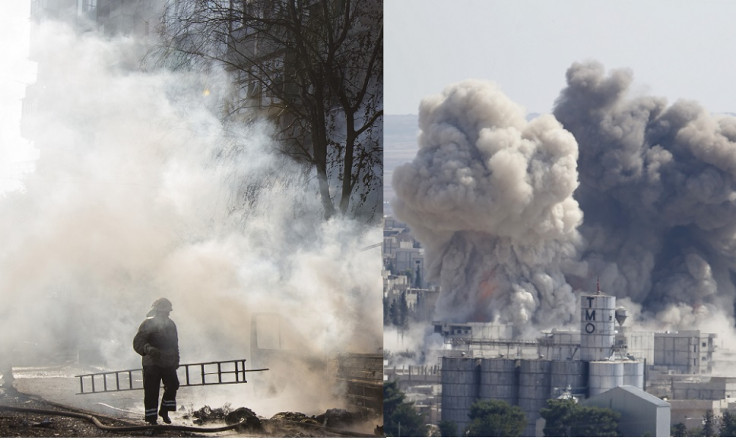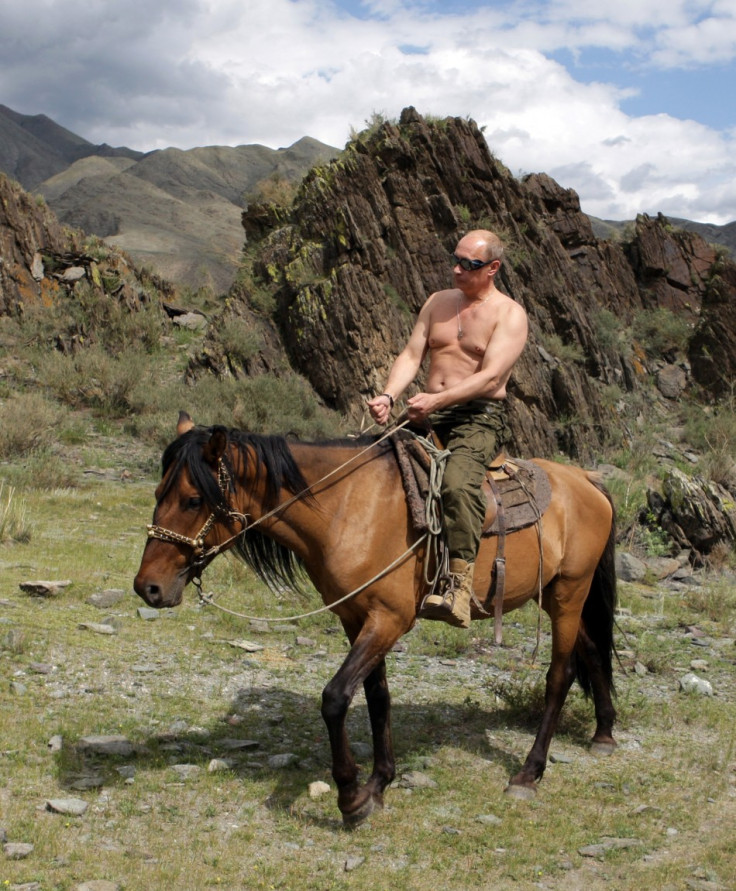Simon Heffer: Britain Must Cast off its Timidity and Face up to the Threat of Vladimir Putin and Isis
When in 2010 the new Coalition government had to make deep spending cuts, one of the departments particularly badly affected was defence. The Army was cut from 102,000 soldiers to 82,000, while the Navy was stripped of several ships (including, for a time, its last aircraft carrier) and the RAF of crack combat squadrons. The spin was that smaller services could be more efficient than larger ones, and Britain had the forces it needed to maintain its place in the world.
Such an assumption relied heavily on an unduly benign view of foreign affairs. And it led to the development of a British policy that was both passive and deluded. Since 9/11 there had been a recognition that Islamic extremism posed a threat not just to Britain, but to the West in general.

But for all that, Britain seemed to underestimate the threat, and to have little conception of the potential for the Middle East to go up in flames – or that it might have to offer support to some pretty unsavoury regimes in that region to defeat extremism.
It was understandable, after the debacle of Britain's involvement in the second Iraq war in 2003 – which was waged on the basis of a lie – that the present government should be reluctant to participate in serious military involvement in that region again.
However, no one seems to have realised that the British national interest might be served by such an intervention, and indeed that it might be requested by a threatened or beleaguered state in that region.
With Britain playing a minor role in air strikes against the Islamic State, at the request of Iraq, such a situation, apparently unpredicted four years ago, has come about. If that were the only international crisis that put demands on Britain it would be serious enough. But another problem that could perhaps bear even more strongly on the national interest, and put a strain on the British defence capability, is Russia.
Cold War hangover
For nearly half a century after the Second World War, British foreign policy was framed in the context of the Cold War and the threat posed to Britain and the West by what was then called the Soviet Union.
When the Berlin Wall came down exactly a quarter of a century ago, and the Soviet bloc dissolved in the succeeding months, it seemed Russia had been neutered. The years of rule in the 1990s by Boris Yeltsin – a man all too easily caricatured as a drunken buffoon – simply hardened British views that Russia was a spent force.
It was a view that should have evaporated very soon after Vladimir Putin came to power, but it did not.
The West tolerated and humoured Putin, long after his ruthless treatment of his opponents in business, politics and journalism had marked him out as seriously unpleasant.
The delusion was such that, for years after he had proved that he had no interest in democracy, human rights or other values common to the West, he continued to receive invites to G8 summit meetings.

It took the assault on Ukraine to make the West realise that Putin was seriously malevolent, and to put him out in the cold – but even that was done with extreme reluctance.
The world is an alarmingly dangerous place, perhaps more dangerous than at any time since the Cuban missile crisis in 1962, when it was thought the world was on the brink of a nuclear war.
The one difference is that, then, America was strong and resolute, and faced down the threat from the Soviet Union. Now America, despite its direct suffering from Islamic extremism, seems to blow hot and cold about how forcefully, and how best, to take it on.
The Obama administration was also slow to make its displeasure felt when Russian-backed forces moved into Ukraine. And while America hesitated, Britain too lost its nerve, so used has it become since 1945 to following the lead of the bigger hitter in the Special Relationship.
Putin and the Islamic State have one thing in common. They have both noted the diffidence of the West, and have exploited it. When the European Union told the Obama administration, earlier in the year, that it was concerned by the way things were going on its eastern borders, the Obama administration said the main responsibility for sorting it out lay with the EU.
And when the Germans, worried about losing their export markets in Russia, for a long time held back from sanctions, Putin felt able to act with impunity. With the oil price now tumbling, and the Russian economy in the tank, he may soon feel the need to take even more risks to shore up his position. And to defeat the Islamic State, the West may have to act not just in its own interests, but in those of some of its enemies, such as Bashar al-Assad.
This is the troubling canvas upon which the West now needs to remake its foreign policy. American isolationism, British paralysis and EU timidity offer enormous opportunities to the West's enemies.
But as British civil servants sit down and prepare for a new strategic defence review next year, the foreign policy that it needs to support demands sensible calibration: calibrated on the understanding that militant Islam may not be the most dangerous threat the West faces, and that some of the most despicable people in the Middle East may be those with whom we have to make alliances of expediency.
Dr Simon Heffer is a British commentator and author who has written columns for The Daily Mail, The Daily Telegraph, The Spectator and The New Statesman. He is the biographer of Enoch Powell, Thomas Carlyle and Ralph Vaughan Williams and recently published High Minds: The Victorians And The Birth Of Modern Britain.
© Copyright IBTimes 2025. All rights reserved.






















